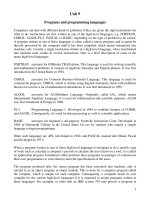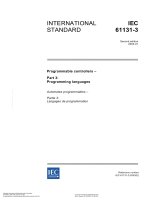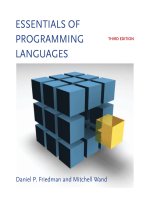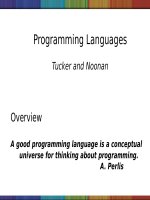GRADUATE PROGRAMMING LANGUAGES: OCAML TUTORIAL DAN GROSSMAN 2012
Bạn đang xem bản rút gọn của tài liệu. Xem và tải ngay bản đầy đủ của tài liệu tại đây (119.93 KB, 43 trang )
<span class="text_page_counter">Trang 1</span><div class="page_container" data-page="1">
Graduate Programming Languages: OCaml Tutorial
Dan Grossman2012
</div><span class="text_page_counter">Trang 2</span><div class="page_container" data-page="2">What is this
<b>These slides contain the same code as play.ml and </b>
other files
• Plus some commentary
• Make of them what you will
(Live demos probably work better, but if
these slides are useful reading, then great)
This “tutorial” is heavily skewed toward the features we need for studying programming languages
– Plus some other basics
</div><span class="text_page_counter">Trang 3</span><div class="page_container" data-page="3">Hello, World!
<b>(* our first program *)</b>
<b>letx =print_string“Hello, World!\n”</b>
<i>• A program is a sequence of bindings</i>
<i>• One kind of binding is a variable binding</i>
• Evaluation evaluates bindings in order• To evaluate a variable binding:
– Evaluate the expression (right of =) in the
<i>environment created by the previous bindings.</i>
– This produces a value.
– Extend the (top-level) environment, binding the variable to the value.
</div><span class="text_page_counter">Trang 4</span><div class="page_container" data-page="4">Some variations
<b><small>letx =print_string“Hello, World!\n”</small></b>
<b><small>(*same as previous with nothing bound to ()*)</small></b>
<b><small>let_=print_string“Hello, World!\n”</small></b>
<b><small>(*same w/ variables and infix concat function*)</small></b>
<b><small>leth =“Hello, ”letw =“World!\n”</small></b>
</div><span class="text_page_counter">Trang 5</span><div class="page_container" data-page="5">manual for directives)
<b>ocamlprof, ocamldebug, …</b>
see the manual
(probably unnecessary)• Later: multiple files
</div><span class="text_page_counter">Trang 6</span><div class="page_container" data-page="6">Installing, learning
• Links from the web page:<b>– www.ocaml.org</b>
– The on-line manual (great reference)– An on-line book (less of a reference)– Installation/use instructions
• Contact us with install problems soon!
• Ask questions (we know the language, want to share)
</div><span class="text_page_counter">Trang 7</span><div class="page_container" data-page="7">• Every expression has one type. So far:
<b>int string unit t1->t2 ’a</b>
<b><small>(* print_string : string->unit, “…” : string *)letx =print_string“Hello, World!\n”</small></b>
</div><span class="text_page_counter">Trang 9</span><div class="page_container" data-page="9">Theory break
Some terminology and pedantry to serve us well:• Expressions are <i>evaluated</i> in an environment• An <i>environment</i> maps variables to values
• Expressions are <i>type-checked</i> in a context• A <i>context</i> maps variables to types
<i>• Values are integers, strings, function-closures, …</i>
– “things already evaluated”
• Constructs have evaluation rules (except values) and type-checking rules
</div><span class="text_page_counter">Trang 10</span><div class="page_container" data-page="10"><b><small>ifx==0 then1 elsex * (fact(x-1))</small></b>
<b><small>(*everything an expression, e.g., if-then-else*)letfact2 x =</small></b>
<b><small>(ifx==0 then1 elsex * (fact(x-1))) * 2 / 2</small></b>
</div><span class="text_page_counter">Trang 12</span><div class="page_container" data-page="12">Anonymous functions
• Functions need not be bound to names
– In fact we can <i>desugar</i> what we have been doing
</div><span class="text_page_counter">Trang 13</span><div class="page_container" data-page="13">Passing functions
<b><small>(* without sharing (shame) *)</small></b>
<b><small>print_string((string_of_int(quadruple 7)) ^“\n”);print_string((string_of_int(quadruple2 7)) ^“\n”);print_string((string_of_int(quadruple3 7)) ^“\n”)</small></b>
<b><small>(* with “boring” sharing (fine here) *)letprint_i_nl i =</small></b>
<b><small>print_string ((string_of_int i) ^“\n”)</small></b>
<b><small>let_ =print_i_nl (quadruple 7);print_i_nl (quadruple2 7);print_i_nl (quadruple3 7)</small></b>
<b><small>(* passing functions instead *)</small></b>
<b><small>letprint_i_nl2 i f =print_i_nl (f i)</small></b>
<b><small>let_ =print_i_nl2 7 quadruple ;print_i_nl2 7 quadruple2;print_i_nl2 7 quadruple3</small></b>
</div><span class="text_page_counter">Trang 14</span><div class="page_container" data-page="14">Multiple args, currying
• Inferior style (fine, but Caml novice):
<b><small>letprint_on_seven f =print_i_nl2 7 f</small></b>
• Partial application (elegant and addictive):
<b><small>letprint_on_seven =print_i_nl2 7</small></b>
<b><small>letprint_i_nl2 i f =print_i_nl (f i)</small></b>
• Makes no difference to callers:
<b><small>let_ =print_on_seven quadruple ;print_on_seven quadruple2;print_on_seven quadruple3</small></b>
</div><span class="text_page_counter">Trang 15</span><div class="page_container" data-page="15">Currying exposed
<b><small>(* 2 ways to write the same thing *)letprint_i_nl2 i f =print_i_nl (f i)</small></b>
<b><small>letprint_i_nl2 =</small></b>
<b><small>funi ->(funf ->print_i_nl (f i))</small></b>
<b><small>(*print_i_nl2 : (int -> ((int -> int) -> unit))i.e., (int -> (int -> int) -> unit)*)</small></b>
<b><small>(* 2 ways to write the same thing *)</small></b>
<b><small>print_i_nl2 7 quadruple</small></b>
<b><small>(print_i_nl2 7) quadruple</small></b>
</div><span class="text_page_counter">Trang 16</span><div class="page_container" data-page="16">Elegant generalization
• Partial application is just an <i>idiom </i>– Every function takes exactly one argument– Call (application) “associates to the left”– Function types “associate to the right”
• Using functions to simulate multiple arguments is called currying (somebody’s name)
• Caml implementation plays cool tricks so full
<i>application is efficient (merges n calls into 1)</i>
</div><span class="text_page_counter">Trang 18</span><div class="page_container" data-page="18">The semantics
<b>A function call e1 e2:</b>
<b>1. evaluates e1, e2 to values v1, v2 (order undefined) where v1 is a function with argument x, body e3</b>
<b>2. Evaluates e3 in the environment where v1 was defined, extended to map x to v2</b>
Equivalent description:
• A function <b>funx ->eevaluates to a triple of x, e, </b>
and the current environment– Triple called a <i>closure</i>
• Call evaluates closure’s body in closure’s
</div><span class="text_page_counter">Trang 19</span><div class="page_container" data-page="19">Closures are closed
<b>return11is bound to a value v</b>
<b>• All you can do with this value is call it (with ())</b>
<i>• It will always return 11</i>
– Which environment is not determined by caller– The environment contents are immutable
</div><span class="text_page_counter">Trang 22</span><div class="page_container" data-page="22">Summary so far
• Bindings (top-level and local)• Functions
– Recursion– Currying– Closures• Types
<b>– “base” types (unit, int, string, bool, …)</b>
– Function types– Type variables
</div><span class="text_page_counter">Trang 23</span><div class="page_container" data-page="23">Record types
<b><small>typeint_pair ={first:int; second:int}</small></b>
<b><small>letsum_int_pr x =x.first + x.second</small></b>
<b><small>letpr1 ={first =3; second =4}</small></b>
<b><small>let _= sum_int_pr pr1 </small></b>
<b><small>+ sum_int_pr {first=5;second=6}</small></b>
A type constructor for polymorphic data/code:
<b><small>type’a pair ={a_first:’a; a_second:’a}</small></b>
<b><small>letsum_pr f x =f x.a_first + f x.a_second</small></b>
<b><small>letpr2 ={a_first =3; a_second =4}(*int pair*)let _= sum_int_pr pr1 </small></b>
<b><small>+ sum_pr (funx->x) {a_first=5;a_second=6}</small></b>
</div><span class="text_page_counter">Trang 24</span><div class="page_container" data-page="24">More polymorphic code
<b><small>type’a pair ={a_first:’a; a_second:’a}</small></b>
<b><small>letsum_pr f x =f x.first + f x.second</small></b>
<b><small>letpr2 ={a_first =3; a_second =4}</small></b>
<b><small>letpr3 ={a_first =“hi”; a_second =“mom”}</small></b>
<b><small>letpr4 ={a_first =pr2; a_second =pr2}</small></b>
<b><small>letsum_int =sum_pr (funx ->x)</small></b>
<b><small>letsum_str =sum_pr String.length</small></b>
<b><small>letsum_int_pair =sum_pr sum_int</small></b>
<b><small>let_=print_i_nl (sum_int pr2)</small></b>
<b><small>let_=print_i_nl (sum_str pr3)</small></b>
<b><small>let_=print_i_nl (sum_int_pair pr4)</small></b>
</div><span class="text_page_counter">Trang 25</span><div class="page_container" data-page="25">Each-of vs. one-of
• Records build new types via “each of” existing types• Also need new types via “one of” existing types
– Subclasses in OOP
– Enums or unions (with tags) in C
• Caml does this directly; the tags are <i>constructors</i>
– Type is called a <i>datatype</i>
</div><span class="text_page_counter">Trang 26</span><div class="page_container" data-page="26"><b><small>typefood=Fooofint |Barofint_pair </small></b>
<b><small>|Bazofint * int |Quuxletfoo3=Foo (1 + 2)</small></b>
<b><small>letbar12=Bar pr1</small></b>
<b><small>letbaz1_120=Baz(1,fact 5)</small></b>
<b><small>letquux=Quux (* not much point in this *)letis_a_foo x=</small></b>
<b><small>matchx with(* better than “downcasts” *)</small></b>
<b><small>Foo i->true</small></b>
<b><small>|Bar pr->false</small></b>
<b><small>|Baz(i,j) ->false</small></b>
<b><small>| Quux ->false</small></b>
</div><span class="text_page_counter">Trang 28</span><div class="page_container" data-page="28">Booleans revealed
Predefined datatype (violating capitalization rules ):
<b>if</b> is just sugar for <b>match</b> (but better style):– <b>ife1 thene2 elsee3</b>
– <b>matche1 withtrue ->e2 |false ->e3</b>
</div><span class="text_page_counter">Trang 29</span><div class="page_container" data-page="29">Recursive types
A datatype can be recursive, allowing data structures of unbounded size
And it can be polymorphic, just like records
<b><small>|Nodeofint * int_tree * int_tree</small></b>
<b><small>type’a lst=Null</small></b>
<b><small>|Consof’a * ’a lst</small></b>
<b><small>letlst1 =Cons(3,Null)</small></b>
<b><small>letlst2 =Cons(1,Cons(2,lst1))</small></b>
<b><small>(* let lst_bad = Cons("hi",lst2) *)</small></b>
<b><small>letlst3 =Cons("hi",Cons("mom",Null))</small></b>
<b><small>letlst4 =Cons (Cons (3,Null), </small></b>
<b><small>Cons (Cons (4,Null), Null))</small></b>
</div><span class="text_page_counter">Trang 30</span><div class="page_container" data-page="30">Recursive functions
<b><small>type’a lst=Null</small></b>
<b><small>|Consof’a * ’a lst</small></b>
<b><small>let reclength lst= (* ’a lst -> int *)matchlst with</small></b>
<b><small>Null ->0</small></b>
<b><small>|Cons(x,rest) ->1 + length rest</small></b>
</div><span class="text_page_counter">Trang 31</span><div class="page_container" data-page="31">Recursive functions
<b><small>type’a lst=Null</small></b>
<b><small>|Consof’a * ’a lst</small></b>
<b><small>let recsum lst= (* int lst -> int *)matchlst with</small></b>
<b><small>Null ->0</small></b>
<b><small>|Cons(x,rest) ->x + sum rest</small></b>
</div><span class="text_page_counter">Trang 32</span><div class="page_container" data-page="32">Recursive functions
<b><small>type’a lst=Null</small></b>
<b><small>|Consof’a * ’a lst</small></b>
<b><small>let recappend lst1 lst2= </small></b>
<b><small>(* ’a lst -> ’a lst -> ’a lst *)matchlst1 with</small></b>
<b><small>Null ->lst2</small></b>
<b><small>|Cons(x,rest) ->Cons(x, append rest lst2)</small></b>
</div><span class="text_page_counter">Trang 33</span><div class="page_container" data-page="33">Another built-in
Actually the type <b><small>’a list </small></b>is built-in:
<b>• Null is written []</b>
<b>• Cons(x,y) is written x::y</b>
<b>• And sugar for list literals [5; 6; 7]</b>
<b><small>let recappend lst1 lst2= (* built-in infix @ *)matchlst1 with</small></b>
<b><small>[] ->lst2</small></b>
<b><small>|x::rest ->x :: append rest lst2</small></b>
</div><span class="text_page_counter">Trang 34</span><div class="page_container" data-page="34">• Now we really have it all
– Recursive higher-order functions– Records
– Recursive datatypes
• Some important odds and ends– Tuples
– Nested patterns– Exceptions
• Then (simple) modules
</div><span class="text_page_counter">Trang 35</span><div class="page_container" data-page="35">Defining record types all the time is unnecessary:
<b>• Types: t1 * t2 * … * tn• Construct tuples e1,e2,…,en</b>
<b>• Get elements with pattern-matching x1,x2,…,xn</b>
• Advice: use parentheses
<b><small>let x= (3,"hi",(funx ->x), funx ->x ^ "ism")</small></b>
<b><small>let z= matchx with (i,s,f1,f2) ->f1 i</small></b>
<b><small>let z= (let (i,s,f1,f2) = x inf1 i)</small></b>
</div><span class="text_page_counter">Trang 36</span><div class="page_container" data-page="36">Pattern-matching revealed
• You can pattern-match anything– Only way to access datatypes and tuples– A variable or _ matches anything
– Patterns can nest
– Patterns can include constants (3, “hi”, …)
<b>• let</b> can have patterns, just sugar for match!• “Quiz”: What is
<b>– letf x y=x + y</b>
<b>– letf pr=(matchprwith(x,y)->x+y)– letf(x,y) =x + y</b>
</div><span class="text_page_counter">Trang 37</span><div class="page_container" data-page="37">Fancy patterns example
<b><small>typesign=P |N |Z</small></b>
<b><small>let multsign x1 x2= let sign x= </small></b>
<b><small>if x>=0then (if x=0then Zelse P) else N</small></b>
<b><small>|_ ->N (* many say bad style! *)</small></b>
<i>To avoid overlap, two more cases</i>
(more robust if datatype changes)
</div><span class="text_page_counter">Trang 38</span><div class="page_container" data-page="38">Fancy patterns example
</div><span class="text_page_counter">Trang 39</span><div class="page_container" data-page="39">• So far, only way to hide things is local let– Not good for large programs
<i>– Caml has a great module system, but we need </i>
only the basics
• Modules and signatures give– Namespace management– Hiding of values and types– Abstraction of types
– Separate compilation
• By default, Caml builds on the filesystem
</div><span class="text_page_counter">Trang 40</span><div class="page_container" data-page="40">Module pragmatics
<b>• foo.mldefines module Foo</b>
<b>• Baruses variable x, type t, constructor C in Foo via Foo.x, Foo.t, Foo.C</b>
<b>– Can open a module, use sparingly</b>
<b>• foo.mlidefines signature for module Foo– Or “everything public” if no foo.mli</b>
• Order matters (command-line)
– No forward references (long story)– Program-evaluation order
<b>• See manual for .cm[i,o] files, -c flag, etc.</b>
</div><span class="text_page_counter">Trang 41</span><div class="page_container" data-page="41">Module example
<b><small>typet1=X1 ofint</small></b>
<b><small>| X2 ofint</small></b>
<b><small>let get_int t= matcht with</small></b>
<b><small>X1 i->i</small></b>
<b><small>|X2 i->i</small></b>
<b><small>let makeEven i= i*2</small></b>
<b><small>let isEven1 i= true</small></b>
foo.ml foo.mli
</div><span class="text_page_counter">Trang 42</span><div class="page_container" data-page="42">Module example
<b><small>typet1=X1 ofint</small></b>
<b><small>| X2 ofint</small></b>
<b><small>let conv1 t= matcht with</small></b>
<b><small>X1 i->Foo.X1 i</small></b>
<b><small>|X2 i->Foo.X2 i</small></b>
<b><small>let conv2 t= matcht with</small></b>
bar.ml foo.mli
</div><span class="text_page_counter">Trang 43</span><div class="page_container" data-page="43">Not the whole language
• Objects• Loop forms (bleach)
• Fancy module stuff (functors)• Polymorphic variants
</div>








